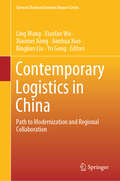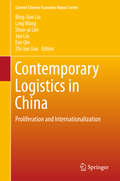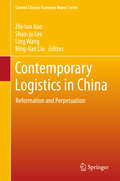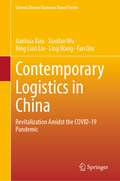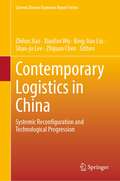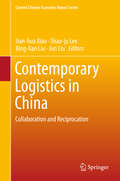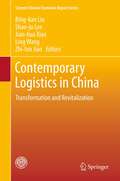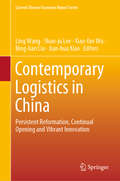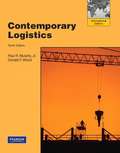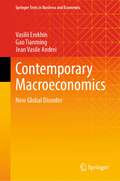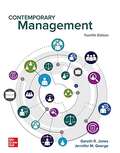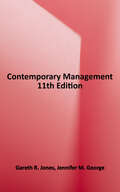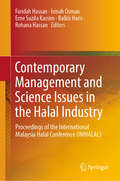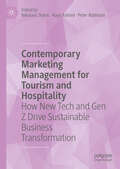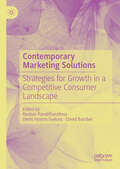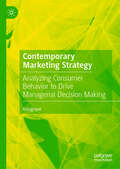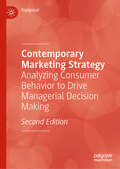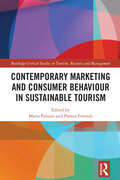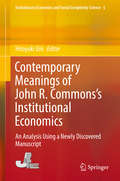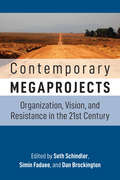- Table View
- List View
Contemporary Logistics in China: Path to Modernization and Regional Collaboration (Current Chinese Economic Report Series)
by Ling Wang Xiaofan Wu Jianhua Xiao Yu Gong Binglian Liu Xiaomei JiangContributed by researchers from the Logistics Research Center at Nankai University, this book provides a systematic exposition on the logistics development in China for the English-speaking community at large. The opening chapter offers an in-depth look at the high-quality development of China's logistics industry within the framework of modernization. The book then covers macro-factors related to logistics technologies and facilities, region-specific policies and plans, industry-wide transformation in transport, manufacturing, commerce, and agriculture. The book also addresses the current state and challenges of China's aviation logistics and examines the new initiatives and trends in the nation's bulk commodities logistics within the realm of its national security strategy. Furthermore, the book offers insights into the development and future prospects of China–ASEAN international logistics under the Regional Comprehensive Economic Partnership (RCEP) agreement. As with the previous volumes, this book aims to present a timely portrait of the rapid growth of China's logistics market and the status quo of its logistics industry. It provides an in-depth analysis of critical issues involved in the ongoing dynamic and multi-faceted development and serves as a valuable reference resource for interested readers in the academic and professional fields.
Contemporary Logistics in China: Proliferation and Internationalization (Current Chinese Economic Report Series)
by Bing-Lian Liu Ling Wang Shao-Ju Lee Zhi-Lun Jiao Jun Liu Fan QinThis book carries on the ideal of providing a systematic exposition of the logistics development in China to the English-reading community at large in the spirit of the four predecessor volumes, published in previous years. This book is the fifth volume in a series entitled "Contemporary Logistics in China", authored by the researchers in Logistics Center at Nankai University. Specially, the opening chapter of this book presents a synopsis of the intent, the history, the framework, the topical coverage and the train of thought of the sequel in the latest five years. As the previous four volumes, our ultimate aim and desire is to present a timely portrayal of the rapid pace of growth of China's logistics market and the status of its logistics industry's evolution.
Contemporary Logistics in China: Reformation and Perpetuation (Current Chinese Economic Report Series)
by Bing-Lian Liu Ling Wang Shao-Ju Lee Zhi-Lun JiaoWhile logistics has caught on as a vital component in China's national development plan, both government agencies at all levels and various types of enterprises have put considerable effort into propelling logistics to a new height Recent logistics developments in China have witnessed a scene of significant boom dotted with few sporadic dips. This book, the third volume in the series on "Contemporary Logistics in China," is a must-read publication, which affords the readers a clearer view of the intrinsic consolidation and increased efforts made amid the recent advancements in China's logistics development. The research findings in this book reflect the expertise and diligence of a team of learned researchers in the highly-regarded Logistics Research Center at Nankai University. The book presents a comprehensive and thorough analysis of the progression and propagation of modern logistics in China, as well as a fresh look at some emerging hot issues with potential bearings on future logistics development. Researchers and practicing professionals alike will find this book an indispensable and timely reference and information resource.
Contemporary Logistics in China: Revitalization Amidst the COVID-19 Pandemic (Current Chinese Economic Report Series)
by Ling Wang Fan Qin Xiaofan Wu Jianhua Xiao Bing Lian LiuThis book provides interpretation of China’s logistics development in a new development paradigm and the rural logistics construction under the Rural Revitalization Strategy. Subjects covered in this book encompass the macro-factors pertaining to the overall development in logistics technologies and facilities, region-specific policies and plans, industry-wide transformation in transport, manufacturing, commerce and agriculture. Specifically, this book highlights the impact of COVID-19 on China’s logistics industry, and demonstrates the efforts and contributions of China’s logistics in the fight against COVID-19 in 2020. Aligns with the previous volumes, the ultimate aim of this book is to present a timely portrait of the rapid growth of China’s logistics market and the status quo of its logistics industry. In so doing, the book offers an in-depth analysis of critical issues involved in the ongoing dynamic and multi-faceted development and provides a valuable reference resource for interested readers in the academic and professional fields.
Contemporary Logistics in China: Systemic Reconfiguration and Technological Progression (Current Chinese Economic Report Series)
by Bing-Lian Liu Shao-Ju Lee Zhilun Jiao Xiaofan Wu Zhijuan ChenThis book encompasses the macro-factors pertaining to the overall development in logistics technologies and facilities, region-specific policies and plans, industry-wide transformation in transport, manufacturing, commerce, and agriculture in China. Specifically, it describes policies and practices in China's high-quality development of logistics, China's business environment construction in logistics, and progress of port logistics in China. It also highlights the applications and prospects of blockchain technology in China's logistics industry in the year 2019. The expositions on and analyses of these subjects are based on the latest available sources and statistical data. As with the previous volumes, the ultimate aim of this book is to present a timely portrait of the rapid growth of China’s logistics market and the status quo of its logistics industry. In so doing, the book offers an in-depth analysis of critical issues involved in the ongoing dynamic and multi-faceted development and provides a valuable reference resource for interested readers in the academic and professional fields.
Contemporary Logistics in China: Transformation And Revitalization (Current Chinese Economic Report Ser.)
by Bing-Lian Liu Shao-Ju Lee Jian-Hua Xiao Jun LiuThis book is the eighth volume in a series entitled “Contemporary Logistics in China,” authored by researchers from the Logistics Research Center at Nankai University. In the spirit of the seven preceding annual volumes, this book carries on the ideal of providing a systematic exposition on the logistics development in China for the English-speaking community at large. Specially, this volume captures China’s logistics development at a crucial turning point. This present report consists of ten chapters, organized into three sections. The introductory section, consisting of three chapters, depicts the current development status of the logistics market, the logistics facilities and technology, and the regional logistics market. The second section addresses the logistics characteristics of four rapidly expanding industries in China—the third-party logistics, the highway logistics, the express logistics, and the multimodal transport. The final section, consisting of three chapters, discusses some hot logistics topics in China. Chapter 8 studies the capital operation in China’s logistics industry. The next chapter deals with the development of intelligent logistics in China. The last chapter of this section presents the development of regional logistics along the Belt and Road routes. As with the previous volumes, the ultimate aim of this book is to present a timely portrait of the rapid growth of China’s logistics market and the status quo of its logistics industry. In so doing, the book offers an in-depth analysis of critical issues involved in the ongoing dynamic and multi-faceted development, and provides a valuable reference resource for interested readers in the academic and professional fields.
Contemporary Logistics in China: Transformation and Revitalization (Current Chinese Economic Report Series)
by Bing-Lian Liu Ling Wang Shao-Ju Lee Jian-Hua Xiao Zhi-Lun JiaoThis present report, as a second volume of the series entitled "Contemporary Logistics in China: an Introduction," follows the same general conceptual organization, yet with updated analysis and discussion of logistics development, under the backdrop of the aftermath of the international financial crisis, the acceleration of the transformation of development mode and the strategic adjustment of the economic structure.
Contemporary Logistics in China: Transformation and Revitalization (Current Chinese Economic Report)
by Bing-Lian Liu Ling Wang Shao-Ju Lee Jian-Hua Xiao Xiao-Fan WuThis book is the tenth volume in a series titled “Contemporary Logistics in China,” authored by researchers from the Logistics Research Center at Nankai University. In the spirit of the nine preceding annual volumes, this book carries on the tenet of providing a systematic exposition of the logistics development in China for the English-speaking community at large. In particular, this volume captures China’s ever-progressing logistics development over the past four decades of “reform and opening” directives and reflects on the technological advancement and systemic reformation. Subjects covered in this volume encompass the macro-factors pertaining to the overall development in logistics technologies and facilities, region-specific policies and plans, industry-wide transformation in manufacturing, commerce, agriculture, and supply chain logistics. Specifically, it describes the innovation in supply chain service and the application of intelligent logistics in China in 2018, and recounts the evolution and expansion of the logistics functionalities in the Free Trade Zones in recent years. The expositions on and analyses of these subjects are based on the latest available sources and statistical data. As with the previous volumes, the ultimate aim of this book is to present a timely portrait of the rapid growth of China’s logistics market and the status quo of its logistics industry. In so doing, the book attempts to afford an in-depth analysis of critical issues pertaining to the ongoing, dynamic and multi-faceted development, and provide a valuable reference to interested readers in the academic and professional fields.
Contemporary Logistics: International Version (10th Edition)
by Donald F. Wood Paul R. Murphy Jr.For undergraduate and graduate Logistics courses. By exploring modern logistics from a managerial perspective, this leading text brings theory to life with its timely, practical, and thorough coverage of the fundamentals of logistics in today's dynamic global landscape. The tenth edition reflects the latest technological and economic changes that have recently occurred in the business world.
Contemporary Macroeconomics: New Global Disorder (Springer Texts in Business and Economics)
by Jean Vasile Andrei Vasilii Erokhin Gao TianmingThis book covers a lot of ground in contemporary macroeconomics, from fundamental theories such as market structures and equilibrium to emerging concepts that reflect the most critical challenges of modern times, including economic slowdowns, the resilience of public health systems, digitalization, environmental footprints, and many more. The COVID-19 outbreak has aggravated the recurrent problems of poverty and income inequality between countries, food insecurity and hunger, unemployment, and social disorders that have resulted in the exacerbation of political, economic, and trade tensions between countries. In view of the damaging consequences of the pandemic for the entire global economy, the book examines how existing macroeconomic tools and policies could be adapted to the new normal to ensure sustainable post-pandemic development and growth.The main text is interspersed with real-life illustrations and cases that demonstrate practical implications of the concepts under study. This makes the reading relevant and active. Every chapter starts with learning objectives and ends with a series of questions and quizzes that enable easier reinforcement of the course content. This book is written mainly for students, but it would be much useful to the broader public audience, including postgraduates, researchers, and business people who will be able to learn all recent updates about macroeconomics and the post-pandemic perspectives of the global economy.
Contemporary Management
by Gareth R. Jones Jennifer M. GeorgeContemporary Management 12e mirrors the changes taking place in today's management practice by incorporating recent developments in management theory and research. It provides current examples of how managers of companies, large and small, address the challenges and opportunities they face and how they can effectively meet them. A hallmark strength of the product is how the authors infuse real managers who seize opportunities, overcome challenges, and effectively manage and lead their organizations in their Manager as a Person feature. Seamlessly integrated into the narrative is the boxed material.
Contemporary Management
by Gareth R. Jones Jennifer M. GeorgeThe 11th edition of Contemporary Management by Jones/George continues to provide students with the most current and up-to-date account of the changes taking place in the world of business management. In this revision, the focus is on making Principles of Management relevant and interesting to today's students - something that we know from instructor and student feedback engages them and encourages them to make the effort necessary to assimilate the text material. This product mirrors the changes taking place in management practices by incorporating recent developments in management theory, and research, and by providing vivid, current examples of how managers of companies large and small have responded to the changes taking place.
Contemporary Management (7th Edition)
by Gareth R. Jones Jennifer M. GeorgeContemporary Management by Jones and George distinguishes itself through its authorship, comprehensive, current contents, exceptionally rich and relevant examples and applications and experiential exercises provided in every single chapter. This #1 best-selling text continues to redefine what principles of management texts should look, sound, and feel like. As an author team Gareth Jones and Jennifer George are uniquely qualified to write about both the strategic and organizational challenges managers face. Contemporary Management is a comprehensive text that surveys the theoretical underpinnings of modern management thought and research. Through a variety of examples from an expanded number of small business to medium and large companies it shows the reader how those ideas are used by practicing managers. A hallmark of this text is its focus on the"Manager as a Person,"which discusses managers as real people with their own personalities, strengths, weaknesses, opportunities, and problems.
Contemporary Management Education: Eight Questions That Will Shape its Future in the 21st Century (Future of Business and Finance)
by Piet Naudé“Why are we so important?”; “What value do we add?”; and “What good do we create?” These are the opening questions posed to management educators in this book. This is followed by uncomfortable questions about colonization (Who is in the centre and whose knowledge counts?) and inequality (Whom do we exclude?). After questioning the easy adoption of technology (What are we embracing?) and the challenge posed by global warming (Can management education help stop climate change?), the author ends by sketching some leadership lessons required for the future: “What lessons can we learn in a black swan event?” Mixing philosophical analyses with anecdotes from experience, the author does not shy away from discussing controversial views to give direction to current debates. Tracing eight such crucial questions and providing well-researched perspectives, this book is an engaging read for anyone interested in the future direction of business schools in particular and management education in general. “There are many books and articles on business education, but few as deep and insightful as Contemporary Management Education. I enthusiastically recommend it to anyone who seeks to understand and improve the training of business leaders.” Peter Tufano, Saïd Business School, University of Oxford “An amazing read. Piet Naude is eclectic and sparkling. He applies his talents to the wicked maze of management education in society. No issue is more important for global business. No writer is better qualified.” Thomas Donaldson, The Wharton School, University of Pennsylvania “A powerful, persuasive, and superbly compelling book. Contemporary Management Education serves as an invaluable and informative reference to the essential issues that are shaping the future.” Sherif Kamel, Dean, School of Business, The American University in Cairo
Contemporary Management and Science Issues in the Halal Industry: Proceedings of the International Malaysia Halal Conference (IMHALAL)
by Rohana Hassan Erne Suzila Kassim Faridah Hassan Ismah Osman Balkis HarisThe proceedings volume focuses on halal management and science topics. Issues related to business model, management, marketing, finance, food security, lifestyle, hospitality, tourism, cosmetics, personal care, legal aspects, technologies and sciences are presented in the chapters. In addition, the book also covers comprehensive areas of halalan toyyiban chains of production from raw materials, ingredients, planning, manufacturing, packaging, logistics, delivery, warehousing, marketing to consumption. Various survey results and few cases explore practical solutions to these issues of interest to academics in university settings as well as practitioners in different industries and government agencies.
Contemporary Marketing
by David L. Kurtz Louis E. BooneBoone and Kurtz's Contemporary Marketing has proved to be the premier introduction to marketing text and package, edition after edition. With each edition, this best selling author team builds and improves upon past innovations, creating the most technologically advanced, student friendly, instructor supported text available. The eleventh edition continues to provide the most current and up-to-date content by including coverage on the events over the past year, such as the recession, the terrorist attacks on America, and coverage on the ethical disasters such as the Enron scandal. Realizing that students need a solid understanding of how these events apply to marketing the authors integrate this content throughout the new edition. The changes to this edition are so significant, that this new edition is more like a new text than just a revision.
Contemporary Marketing (Seventeenth Edition)
by David L. KurtzCONTEMPORARY MARKETING, Seventeenth Edition, is the proven, premier teaching and learning resource for foundational marketing courses. The authors provide thorough coverage of essential marketing principles, exploring all components of the marketing mix, and providing practical guidance to help students prepare for successful marketing careers. This trusted text continues to grow stronger with each groundbreaking new edition, preserving what has made previous editions perennial best-sellers, while adding innovative new features and up-to-date information on current trends, topics, research, and best practices in this ever-evolving field. Because it is so technologically advanced, student-friendly, instructor-supported, and more relevant than ever, CONTEMPORARY MARKETING, Seventeenth Edition, remains in a class by itself.
Contemporary Marketing Management for Tourism and Hospitality: How New Tech and Gen Z Drive Sustainable Business Transformation
by Peter Robinson Roya Rahimi Nikolaos StylosHospitality and tourism is the second largest industry in the world and is a driver of job growth and economic prosperity, accounting for 1 in 10 jobs worldwide. As such, the marketing of hospitality and tourism is a fast developing field, influenced by the latest advances in sustainability and social marketing as well as a new generation of consumers. Gen Z individuals and Gen Alphas are the future employees and consumers of this industry. They do not only shape new consumption patterns, but also bring their values to work life, thus changing the attitudes towards the employee-employer relationship and how work is being done. As Generation Z will represent more than 50% of the workforce worldwide in the next few years, it is of utmost importance to explore their particular behavior in both the working environment, as well as their consumption patterns. As such, this contributed volume brings a focus on the contemporary marketing (and management) aspect of thetourism and hospitality industry as this is/will be shaped by Smart / Industry 4.0 apps, priority over sustainable futures, and Gen Z and Alpha individuals’ aspirations, expectations, preferences and behaviors. The latest technological advancements and the challenges associated to a sustainable planet will be decisive factors in tourism and hospitality marketing. The authors offer insights into numerous aspects into the hospitality and tourism industry, making it an invaluable reference point for contemporary tourism and hospitality marketing research.
Contemporary Marketing Solutions: Strategies for Growth in a Competitive Consumer Landscape
by Denis Hyams-Ssekasi Roshan Panditharathna David BamberThe function of marketing is regarded as a mechanism that provides practical and theoretical solutions to contemporary businesses worldwide. In this edited book, a cast of international contributors address new and emerging areas within marketing, such as sustainable marketing, the circular economy, and how technologies drive and provide marketing solutions. Rather than exploring the issues, this book focuses on the solutions that these emerging areas provide for businesses. An essential resource for researchers and students, this book demonstrates how marketing activities are relevant to contemporary businesses, offering a state-of-the-art look at emerging trends.
Contemporary Marketing Strategy: Analyzing Consumer Behavior to Drive Managerial Decision Making
by RajagopalThe broad foundation of this book is laid on the conceptual discussions on consumer theories and applied arguments on shifts in consumer behavior. This book develops knowledge and skills on building market-centric and competition-oriented models. Discussions in the book illustrate strategies for managing competitive market interventions through advanced marketing-mix elements across nine chapters. Various perspectives on innovation and technology for expanding and establishing business in competitive markets are critically reviewed in these chapters. This book examines advanced marketing-mix and several consumer-centric strategies to co-create new businesses in new markets by associating consumers.
Contemporary Marketing Strategy: Analyzing Consumer Behavior to Drive Managerial Decision Making
by RajagopalThis book offers knowledge and skills about developing market-centric and competition-oriented models and illustrates the power of consumers in managing sensitive market interventions through marketing-mix strategies, innovation, and technology applications for competitive markets. This updated edition discusses applied marketing concepts in real-life situations, incorporating new insights on the role of technology in marketing, with a particular emphasis on AI and machine learning, while also addressing topics related to consumer privacy and data protection. It will serve as a valuable resource for researchers interested in marketing in the digital age.
Contemporary Marketing and Consumer Behaviour in Sustainable Tourism (Routledge Critical Studies in Tourism, Business and Management)
by Pantea Foroudi Maria PalazzoThis book delves into contemporary trends in consumer behaviour and marketing strategies in the field of sustainable tourism. It explores effective promotion methods for sustainable tourism development, emphasizing the involvement of various stakeholders such as communities, local residents, visitors, organizations and governments.With an international perspective, this interdisciplinary book specifically examines the human aspects of environmental change, covering topics like smart growth; heritage; place identity, place image, and reputation; technology and innovation; life-cycle thinking and circular economy; waste management; ecosystems and global change; transitions to low-carbon economy; etc. The book raises several original research questions about the essential nature of sustainable tourism in the post-pandemic era, aiming to fill knowledge gaps and drive transformative change. Offering a blend of theoretical insights and practical case studies, this book is valuable for students, researchers and academics in business management, marketing, communication and tourism, as well as for managers and decision-makers.
Contemporary Mathematics for Business and Consumers
by Robert Brechner; George BergemanGain a strong understand of today's key mathematical concepts and learn how to use math for success in business today with Brechner/Bergeman's CONTEMPORARY MATHEMATICS FOR BUSINESS AND CONSUMERS, 9E. This reader-friendly approach helps you overcome any math anxiety and confidently master mathematical concepts. A proven step-by-step instructional model allows you to progress through one topic at a time without being intimidated or overwhelmed. Learning features connect the topics you're learning to the latest business news and even provide helpful personal money tips. You can immediately practice concepts and hone essential skills with more than 2,000 exercises. Jump Start problems introduce each new topic and provide worked-out solutions to help you start homework, while Master-it Problems offer detailed interactive explanations. In addition, author-created videos walk you step-by-step through sample problems to ensure understanding.
Contemporary Meanings of John R. Commons’s Institutional Economics: An Analysis Using a Newly Discovered Manuscript (Evolutionary Economics and Social Complexity Science #5)
by Hiroyuki UniThis book is the first to reinterpret John R. Commons's Institutional Economics with a newly discovered manuscript written in 1927 in order to find its contemporary meanings in economic theories. Commons aimed to establish institutional economics to understand capitalism in the USA of that time, when people's collective actions were gaining importance with the emergence of powerful labor unions, oligopolistic corporations, and national judicial systems. Setting three types of transactions as his central concepts for analysis, Commons described dynamics of capitalism as multiple and cumulative causal processes of transactions, through which the final goal should be achievements of a ``reasonable value''. He also believed that the reasonable value could be achieved by the evolution of institutions. There is no doubt that Commons's ideas proposed in Institutional Economics such as transactions and collective actions greatly inspired later economists; however, few studies have contributed to comprehensive understanding of the origin of his masterpiece. To what extent and in what sense had Commons rejected or accepted previous classical economics or marginalism for constituting his original institutional economics? What are the meanings and limitations that reasonable value may have for contemporary political economy? Institutional Economics as attempts to resolve deep economic problems at that time. Commons's efforts create important implications for us, those who are living in an era after the global financial crisis and confronting various challenges to political economy.
Contemporary Megaprojects: Organization, Vision, and Resistance in the 21st Century
by Seth Schindler, Simin Fadaee and Dan BrockingtonContemporary megaprojects have evolved from the discreet, modernist projects undertaken in the past by centralized authorities to encompass everything from large-scale construction to space exploration. Contemporary Megaprojects explores how these projects have been impacted by cutting-edge technology, the private sector, and the processes of decentralization and dematerialization. With case studies ranging from mega-plantations in Southeast Asia to ocean mapping to sports events, the contributions in this collected volume demonstrate the increasing ambition and pervasiveness of these projects, as well as their significant impact on both society and the environment.
